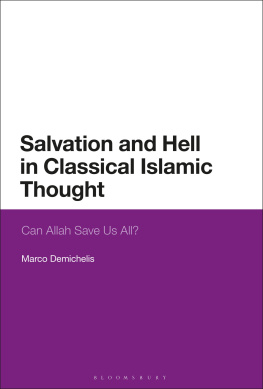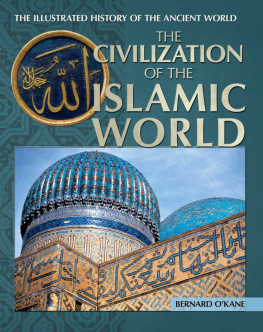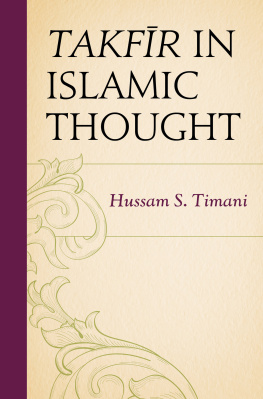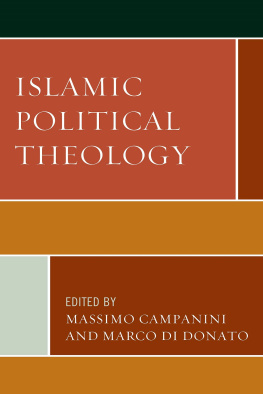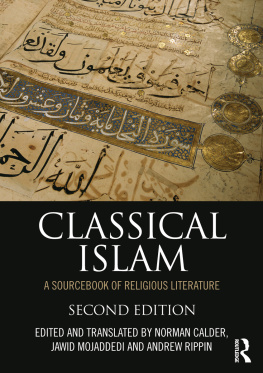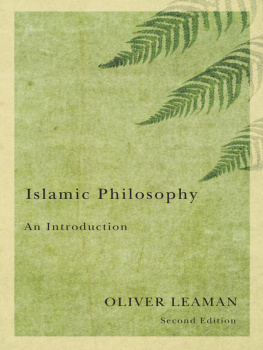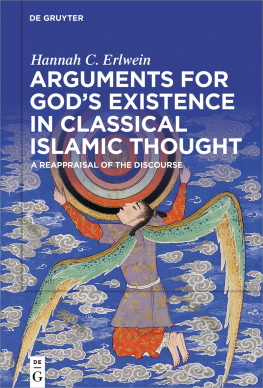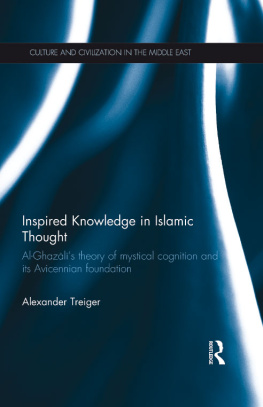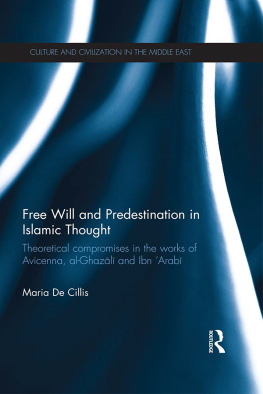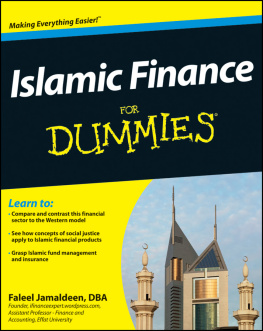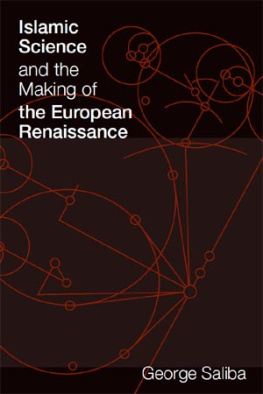
Salvation and Hell in Classical
Islamic Thought
Also available from Bloomsbury
Alternative Salvations, edited by Hannah Bacon, Steve Knowles and Wendy Dossett
The Composition of the Quran, Michel Cuypers
Sufis and Salafis in the Contemporary Age, edited by Lloyd Ridgeon
Piety, Politics and Ethics in Southeast Asian Islam, Robert Rozehnal

Contents
This academic project was prompted by reading the study by M. Hassan Khalil entitled Islam and the Fate of Others: The Salvation Question (Oxford University Press, 2012) and his edited work Between Heaven and Hell: Islam, Salvation and the Fate of Others (Oxford University Press, 2013), both of which I was invited to review for the Marginalia Review of Books. M. Hassan Khalils scientific work is an eminent achievement in which the salvation of others is investigated within the thought of four prominent Islamic Scholars: al-Ghazl, Ibn Arab, Ibn Taymiyya and Rashd Ri.
This book, on the other hand, aims to investigate the heterodox theory of Fan al-Nr, an expression used by Ibn Taymiyya in al-Radd al man qla bi-fan al-janna wa-l-nr (the enjoinder to those who maintain the annihilation of the Garden and the Fire). According to this, there will be an unclear post-mortem time when Hell will be empty or no longer inhabited. However, different primary sources report that the Eschatological salvation of Muslims and non-Muslims in Islamic thought emerged as a topic of consideration from at least the 230s AH (eighth-century CE ).
This is the main reason why this work will examine the Fan al-Nr from the formative age (second/eighthfourth/tenth centuries) to the speculations of scholars already analysed, such as al-Ghazl (d. 1111/504) and Ibn Taymiyya (d. 1328/728), but also considering the philosophical thought of al-Kind (d. 873/259), al-Frb (d. 950/338) and Ibn Sn (d. 1037/428), the mutakallimn al-Ashar (d. 936/324) and al- Mturd (d. 944/332), and lastly Ibn Qayyim al-Jawziyya (d. 1350/751).
I worked on this project from the second year of my Research Fellowship (post-PhD) at the Department of Religious Studies of the Catholic University of Milan until the end of the fourth year, when I started the publication process.
For this reason, I first wish to thank Prof. Paolo Branca for his total support, suggestions and advice in highlighting the academic interest in this project.
In parallel, I would also like to express my gratitude to the University of Yale and in particular the MacMillan Center for International and Area Studies for having given me the opportunity to spend nine months as a Visiting Research Fellow to work at the Sterling Memorial Library and the Beinecke Rare Book and Manuscript Library. Prof. Frank Griffel as my supervisor, but also Prof. Gutas Dimitri and Prof. Gerhard Bowering, gave me important suggestions during my period at Yale.
I also wish to thank Prof. Emeritus Claude Gilliot (Iremam, Aix-Marseille University), Prof. Jon Hoover (University of Nottingham), Dr Khalid el-Abdaoui of the University of Vienna and Prof. Yousef Casewit (University of Chicago) for their valuable suggestions during these years of academic research.
Last, but not least, I would like to thank Dr Robin Dougherty, Middle Eastern Section Librarian, for her help during the time I spent on the third floor of the Sterling Memorial Library of Yale University.
All dates appears in parentheses with the classical dual calendar of reference, CE (Common Era) first and AH (Anno Hegirae) second.
A simplified transliteration system has been chosen to make reading easier as well as for the recognition of Arabic word roots. Thanks to this rigorous scientific method, inaccurate transliterations are avoided. Long vowels have been shown (, , ) as well as the diacritical marks of the hard Arabic letters (, , , , ); the ayn letter (identified by the inverted apostrophe) and hamza (rendered with the normal apostrophe) have also been shown in accordance with the reference language.
Lastly, the letter J has been adopted for Jim (Arabic letter), K for Kha, Dh for Dhal, Sh for Shin, Gh for Ghain, H for Ha and I for Ya. As far as the pronunciation of the letters is concerned, the sound sh corresponds to sc, and w to u; th and dh are pronounced as the English th of the.
This book intends to investigate Muslim and non-Muslim salvation in Islamic thought, from the formative age (eighthtenth centuries) up to the speculations of authors like al-Ghazl (d. 1111/504), Ibn Taymiyya (d. 1328/728) and Ibn Qayyim al-Jawziyya (d. 1350/751). Specifically, it addresses the heterodox theory of Fan al-Nr: an expression used in particular by Ibn Taymiyya in al-Radd al man qla bi-fan al-janna wa-l-nr (the enjoinder to those who maintain the annihilation of the Garden and the Fire), according to which there will be a time in an unclear eschatological future when Hell is empty or no longer inhabited. The development of this assumption will be analysed, focusing on the thought of relevant mutakallimn, mystics and philosophers over seven centuries in an attempt to explain the steps that formed this theoretical eschatological assumption.
The relatively unknown topic of Fan al-Nr has recently been reconsidered in books and articles by Mohammad Pagani and others. However, if these works are analytically and academically important in developing a specific study on the Annihilation of Hell as well as on Islamic eschatology, they do not form a historical digression of Fan al-Nr in Islamic thought.
On the contrary, this is the main goal of this book: to interpret the evolution of the Annihilation of Hell as a theoretical doctrine emphasizing the evolutionary process of Islamic thought during the formative and classical age. For me, the Fan al-Nr is the historical paradigmakhira h ).
The salvation of others reflects not only on believers of other faiths as well as non-believers (Kuffr), but is a topic in which inclusive and exclusive religious policies, theological interpretations and hermeneutic understandings point out the Islamic level of global comprehension of otherness, as a religion able to dissolve the moral-ethical peculiarities of single-faith membership, to move towards a true sharing of universal values.
As maintained by Fard Esack, to act against the iniquity of this world for the oppressed (
However, this book remains focused on the first centuries of the Islamic age without any reference to contemporary Islamic elucubrations: this is why any theological assumption needs to be considered in relation to the historical age of reference. At the same time, this work cannot develop a study based on proto-Shiite or Shiite sources; a limited investigation goes from al-Frb (d. 950/338) and his complex religious identity to Ibn Sn (d. 1037/428) and Mulla adra Shrz (d. 1640/1049), but, in particular with reference to Shrz, the analysis is restricted. The complexity of the Shiite eschatological understanding is too great to be discussed in the same work. At the same time, this study does not have the intention of investigating the Islamic religious affiliation of al-Frb or Ibn Sn, questioning their more inclusive attitude and then the more exclusivist one of their followers.
The four main chapters are connected by the process of the formation of Islamic orthodoxy and heterodoxy, which were not yet clearly distinguished in the early centuries. A historical focus will be necessary to describe the evolutionary understanding of the annihilation of Hell in the formative phase of Islm until the consolidation of Tradition (ninthtenth centuries). Later, more speculative factors
Next page
